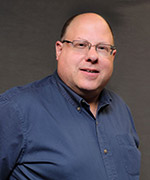'A Sense of Family'
Barry Friedman shares what he gained from the MSIT cohort model
Barry Friedman (MSIT ‘17) has spent the past 20 years working in IT at Walgreens, the past 12 of which have been as a systems engineering architect. With so much time in the IT industry, Friedman has come to a clear realization: you can’t stop learning.
“If you’re not acquiring new abilities,” he said, “then you’re falling behind the curve.”
A common trait Friedman has seen across much of the IT field is a lack of knowledge of the business side of the industry. Without that understanding of how the business works, technical employees aren’t able to truly grasp how they provide value to their business.

That is why he decided on Northwestern Engineering’s Master of Science in Information Technology (MSIT) part-time program.
“The entire experience in the program is a learning experience,” Friedman said. “Having the cohort model was good, particularly given that our group was composed of different individuals with different strengths and weaknesses.”
Friedman’s classmates specialized in IT infrastructure, network management, programming, security, and more. The diversity of classmates in the MSIT program was one of the biggest draws for Friedman.
“We covered all the major areas of the model that we were following, and we had varying levels of understanding in terms of business,” Friedman said. “The cohort gives you the ability to work with different people and learn how to get along with different types of people.”
Friedman had learned this early on in his career, but his time in MSIT reinforced the fact that different people work in different ways. The ability to bridge the different styles becomes an asset in the workplace — and this is beneficial to any organization.
The cohort model employed by the MSIT program made it possible for him to interact with individuals from different cultures and work methods as they worked toward a common goal. He developed a special bond with many of the students in his cohort — a bond still present today as nearly a dozen of them get together as friends several times a year.
“You’re with this group of people throughout the entire journey,” Friedman said. “You develop a brotherhood and sisterhood with your classmates.
"There is a sense of family in MSIT.”

